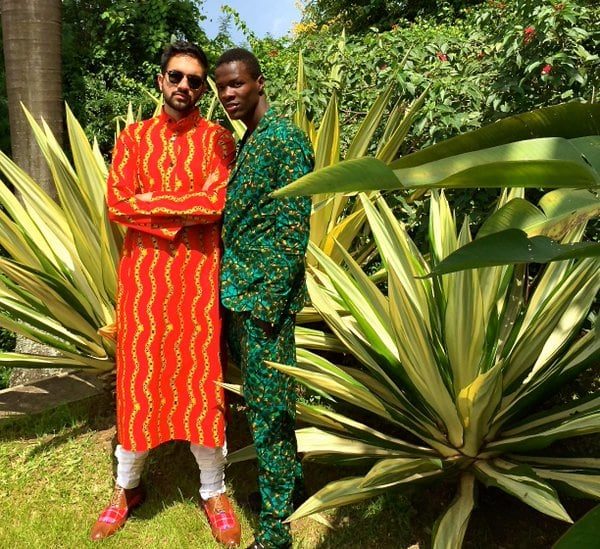You Want Another Rap
You can’t separate Drake from Toronto or Heems from Queens. Young Cardomom and HAB rap like they are from Kampala, Uganda. Because they are.

Young Cardomom (the writer) and HAB. Image via Twitter
I know I should open with an origin story about “Kanda [Chap Chap]” but I can’t actually remember why HAB and I decided to make a song about Chapati. Yet, that is not such a jump from the overall goal we had – and continue to have – for our music: to play with people’s conceptions. However, it’s challenging to change any conceptions without a sound, so we were fortunate to have encountered Hannz Tactiq early this year. Hannz is a prominent Ugandan producer who has worked with artists such as Chameleone and A Pass, and possesses serious talent in his fingers. We gave him an outline of the beat we had in mind. We wanted to create a song with a beat that made your head nod, a familiarity that would almost disguise our subject matter. Once you hear the bass kick off and the claps start, your mind goes to a certain place. Maybe it’s Deuces in Kabalagala on a Monday night, or maybe it is Fusion Autospa in Munyonyo, but either way, we’ve taken you there faster than a boda.
“Kanda [Chap Chap]” is our first song, but it does a good job of explaining who we are as a duo. It’s a sound born out of nights out in Kampala and at home in front of TRACE. We reference M.I. Abaga’s “Bad Belle” in our chorus, we ride our three-wheeler through our video with K.O’s “Caracara” in mind, and we try and channel some Bobi Wine as we tell stories about life in Kampala. Like the Ghetto President’s “Kiwaani”, “Kanda [Chap Chap]” is light-hearted but we also use chapati as a way to discuss identity, migration, and pride.
HAB and I are both Ugandans with roots abroad; HAB’s are in South Sudan, and mine are in India. We play on that as he raps in a mixture of Nubi, Luganda, Swahili, and English, and I start my second verse with “I got the same history as chapati/origins of India but born in UG/rock brown skin but ndi munnayuganda/luyembe ko muluzungu ne muluganda.” The last lines are in Luganda and translate into “rock brown skin but I’m Ugandan/I can rap in both English and Luganda.” Our lyrics and choice of language are rebuttals of what Ugandan society expects of us – that someone with some South Sudanese roots is forever “Nubi” and that Indian Ugandans are actually just Indians in Uganda. Chapati embodies this, as it’s something that many thought could only ever be understood as a South Asian dish, but has become a staple in Uganda. What used to be used to eat your main dish is now it’s own dish. Only in Kampala can I walk up to a roadside vendor and order two chapatis as my lunch.
And then there’s our pride. There are many artists in Ugandan hip hop, as well as across Africa, who rap in a manner that imitates the sounds of New York City’s HOT97 or Power 105.1. This is initially who we were when we started this all a couple of months ago. But we came to a point where we asked ourselves why the two of us should try to sound like we were ‘repping the BX when we were sitting in Kabalagala. It’s not just that doing so wouldn’t be honest, it’s also that we would be coming up against one of the best parts of hip hop: local pride. You can’t separate Drake from Toronto, Heems from Queens, or Blue Scholars from Seattle. So we rapped like who we are in Kampala: two fools who know chapati. And that’s what we’ll keep doing.
- The title of the post, “You want another rap,” refers to a meme remixing a famous speech of Uganda’s President Yoweri Museveni. This post is part of our #LinerNotes series, where musicians talk about making music.


